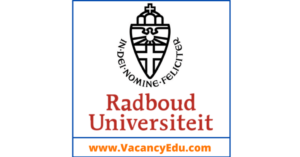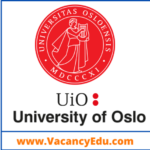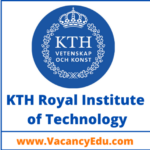Radboud University, Nijmegen, Netherlands invites online Application for number of Fully Funded PhD Degree at various Departments. We are providing a list of Fully Funded PhD Programs available at Radboud University, Nijmegen, Netherlands.
Eligible candidate may Apply as soon as possible.
(01) PhD Degree – Fully Funded
PhD position summary/title: PhD Position: Applied Infrared Spectroscopy with Ultrabroadband Sources
Are you an enthusiastic young scientist who likes to work with and/or develop new spectroscopic instruments? And do you hold a Master’s degree in physics (photonics), electrical engineering or a related field? Would you like to be involved in the research and development of instruments based on the latest ultrabroadband mid-infrared intrapulse difference frequency generation source to perform multispecies detection in demanding applications as in environmental and exposure monitoring, and the green hydrogen industry? If so, then you have a part to play as a PhD candidate in our research team.
Put your ideas to the test at our green campus and push your boundaries in an internationally friendly environment. Gas sensing plays an important role in many fields. It is used to monitor climate change, optimise industrial control, as well as observe important chemical or biological reactions related to life sciences. Among several optical methods for measuring gas concentrations, absorption spectroscopy with broadband, laser-based infrared sources is emerging as a promising and effective tool. In particular, the newly developed high-power intrapulse difference frequency generation (IDFG) based sources extend deep into the mid-infrared wavelength range with unprecedented spectral coverage (2–11.5 µm).
In our lab, we have recently demonstrated a system comprising an in-house built Fourier transform spectrometer (FTS) with such a source for multispecies trace gas detection. This system has shown an excellent performance during in-situ measurements of a wide range of molecular species with high sensitivity (Opt. Express 32, 14506: 2024).
Here, coherent open-path spectroscopy (COPS) will be used for field measurements. In contrast to conventional absorption spectroscopy, COPS eliminates the use of a gas cell and guides the light beam over an outdoor path for direct interaction with the area of interest.
This PhD project aims to further explore the potential of developing a robust system using COPS and deploying it in the field for gas measurements in real-life applications, for example environmental monitoring of greenhouse gases and air pollutants (i.e. CH4, CO2, N2O, NH3, SO2, CO, etc.) and plasma-based conversion of industrial waste gases. Together with our team, you will develop a field-deployable spectrometer, perform field measurements, and analyse and interpret the data. We are looking for a PhD candidate who is eager to conduct this applied research.
Deadline :30 June 2025
(02) PhD Degree – Fully Funded
PhD position summary/title: PhD Position: Quality Control for Machine Learning Using Bayesian Networks and AutoML at Donders Centre for Cognition
Are you interested in making the processes for building machine learning models more transparent and explainable? Would you like to work in interdisciplinary teams to uncover the needs of clinical decision support systems so that such needs can be integrated into these novel processes? Then this position might be for you!
In this PhD position you will be part of the ELSA lab on Legal, Regulatory and Policy Aspects of Clinical Decision Support Systems. This interdisciplinary lab studies the technological, ethical and legal requirements necessary for the development and use of clinical decision support systems (CDSSs), so that their use in the clinic can be subject to rigorous quality control and certification. In this position, you will work on exploring synergies between Bayesian networks and AutoML (automated machine learning) to make better data science. On the one hand, you will work on learning Bayesian networks supported by AutoML. This will allow for the development of reproducible, data-driven Bayesian-network pipelines, which should also allow for user interaction (e.g. domain knowledge).
On the other hand, you will work towards making AutoML systems more interpretable by developing Bayesian network explanations, which will allow users to get insights into the pipelines evaluated by an AutoML system. This position is linked to CDSSs as the healthcare domain is envisioned as the main application area where the novel methods will be demonstrated.
You will be part of the Probabilistic Graphical Models group at the Donders Centre for Cognition and of the interdisciplinary team of researchers and PhD candidates on this consortium project. In addition to research in this domain, you will contribute to academic teaching in the AI BSc and MSc programmes, follow courses offered by the Donders Graduate School and the national research schools IPA and SIKS, and collaborate with inspiring colleagues in the international PGM research community.
Deadline : 08 June 2025
View All Fully Funded PhD Positions Click Here
(03) PhD Degree – Fully Funded
PhD position summary/title: PhD Position: Self-Assembling Interactive Hydrogel Actuators with Adaptive Stimuli-Transduction Pathways
This PhD project aims to develop a unique chemistry-based strategy to build interactive actuators based on electro-responsive hydrogels. These gels concomitantly self-assemble amongst electrodes and guide the control mechanisms that in turn direct their growth and actuation. As the self-assembly of the hydrogels is reversible, the input voltages (+/–) applied to the electrodes can be optimised in a machine-learning approach to optimise the gel morphology and the embedded stimuli-transduction pathways towards the targeted mechanical behaviour. Departing from classical hydrogels that simply swell or contract, far more complex spatiotemporal actuation routines will be established, emerging from the transient formation of redox-chemistry based cross-links, electro-responsive assemblies that provide conductive pathways to transfer the input voltages to the hydrogel growth/actuation front, and feedback mechanisms based on chemical reaction networks and supramolecular assemblies.
This research combines hydrogels with systems chemistry – i.e. reaction networks, self-assembly – in mesoscale structures and out-of-equilibrium matter, and involves working with dedicated microscopy techniques and custom-made multi-electrode set-ups. You will communicate your findings through publications in peer-reviewed journals and at international conferences, and also be involved in training and teaching BSc and MSc students. Your teaching load may be up to 10% of your appointment.
Deadline : 29 June 2025
(04) PhD Degree – Fully Funded
PhD position summary/title: PhD Position: Traceable Inference in Bayesian Networks at the Donders Centre for Cognition
In this PhD position you will be part of the Ethical, Legal, and Societal Aspects (ELSA) lab on legal, regulatory and policy aspects of clinical decision support systems. This interdisciplinary lab studies which technological, ethical and legal requirements need to be imposed on the development and use of clinical decision support systems (CDSSs) so that their use in clinics can be subject to rigorous quality control and certification. The work package you will work on is about traceability, source attribution and justification in CDSSs, that is, decision support systems where the underlying model (a Bayesian or Credal network) is annotated with the origin of the information it captures. This allows for accountable development and use of these systems. Your task will be to study how accountability can be facilitated by traceable development and annotated inference and explanation in (variants of) Bayesian networks. We thus focus on the technological advances necessary to realise accountability in the usage of CDSSs.
You will be part of the Probabilistic Graphical Models group at the Donders Centre for Cognition as well as the interdisciplinary team of researchers and PhD candidates on this consortium project. In addition to research in this domain, you will contribute to teaching in the BSc and MSc programmes in AI, follow courses offered by the Donders Graduate school as well as participate in the IPA and SIKS national research schools, and collaborate with inspiring colleagues in the international PGM research community. Your teaching load may be up to 10% of your appointment.
Deadline :08 June 2025
(05) PhD Degree – Fully Funded
PhD position summary/title: PhD Position: History and Philosophy of Modern Physics
You will conduct research in the history and philosophy of modern physics with a focus on philosophical discussions around physics in the nineteenth or twentieth century. Your research can, for example, concern the philosophical implications drawn from physical theories such as classical mechanics, statistical mechanics or quantum physics, or the roles of physics in the history of philosophy. Possible topics include conceptions of causality, chance, emergence, or chaos theory.
The project will be supervised by Dr Marij van Strien and Prof. Klaas Landsman will be your PhD supervisor. As a member of both CHPS and RCNP, you will work in an interdisciplinary team and collaborate with philosophers, historians of philosophy, philosophers of science, and theoretical and mathematical physicists. You should be willing to contribute to the general research programme of both CHPS, which studies philosophy and science as historically intertwined fields, and RCNP, which seeks to improve ties between mathematics, physics, and the history and philosophy of science.
Your daily activities will mainly consist of conducting research in the history of modern physics and philosophy. You will be expected to write a PhD thesis, eventually publish papers, and present your work at international conferences and workshops. Further, you will participate in seminars, reading groups and other activities of CHPS and RCNP. Collaboration with other PhD candidates and faculty members will be encouraged. You will be part of a strong and coherent network of researchers.
You will devote 75% of your time to research for and writing your PhD thesis. The remaining 25% will be spent on training and academic service to the Faculty of Philosophy, Theology and Religious Studies, including teaching (about 10%).
Deadline : 22 June 2025
Polite Follow-Up Email to Professor : When and How You should Write
Click here to know “How to write a Postdoc Job Application or Email”
(06) PhD Degree – Fully Funded
PhD position summary/title: PhD Position: ‘Chasing Gamblers’ – Development and Validation of an Early-Signalling Tool
The Decision, Development and Psychopathology (D2P2) lab (PI: Bernd Figner) is looking for a PhD candidate to investigate the psychological processes underlying risky decision-making in gambling, with a focus on online gambling in youths. These insights will be used to develop, evaluate and disseminate a tool capturing early signs of problematic gambling, with a focus on chasing behaviour (i.e. the intensification of gambling after losses and/or wins). The ultimate goal is to use this tool for early-signalling and screening purposes so that individuals at risk for gambling problems can be identified early and further harmful development can be stopped.
As a PhD candidate, you will work in a highly interdisciplinary international (NL, BE, UK) team consisting of decision scientists, cognitive and clinical psychologists, psychiatrists, experts from highly specialised addiction care clinics in the Netherlands, and individuals with lived experience. The research you will conduct involves advanced statistical modelling and quantitative evaluation research, qualitative studies, as well as co-creation with at-risk individuals. As part of your PhD position, you will have a 10% teaching load and the opportunity to work towards the University Teaching Qualification.
You will join the Decision, Development and Psychopathology (D2P2) lab, which belongs to the Experimental Psychopathology and Treatment research programme of the Behavioural Science Institute (BSI), and you will be embedded in both BSI’s PhD graduate school and the Nijmegen Institute for Scientist-Practitioners in Addiction (NISPA). Besides creating scientific papers based on your work, we also encourage you to present your work at relevant workshops and conferences.
Deadline : 08 June 2025
(07) PhD Degree – Fully Funded
PhD position summary/title: PhD Position at the Donders Centre for Cognition: Talker Variability in Speech RecognitionYou will work together with James McQueen and Orhun Ulusahin on an NWO-funded project (’Plugging talkers in: A new solution to the variability problem in human speech recognition’). The project seeks to understand how listeners cope with the fact that spoken words are acoustically hugely variable. Words vary across talkers (e.g. the same word is pronounced in a physically dramatically different manner by a two-year-old girl versus an 80-year-old man) and words vary not only segmentally but also prosodically. The project explores the hypothesis that listeners store knowledge about how individual talkers speak and ’plug in’ that knowledge as they recognise those individuals’ words. The project has two aims: (1) to use computational modelling to build a new Bayesian model with ’plug-ins’, and (2) to run word-learning experiments (several using eye tracking) to test the model. You will be developing, running, analysing and writing up the experiments.
Deadline : 13 June 2025
About Radboud University, Nijmegen, Netherlands –Official Website
Radboud University is a public research university located in Nijmegen, Netherlands. The university bears the name of Saint Radboud, a 9th century Dutch bishop who was known for his intellect and support of the underprivileged.
Established in 1923, Radboud University has consistently been included in the top 150 of universities in the world by four major university ranking tables. As of 2020, it ranks 105th in the Shanghai Academic Ranking of World Universities. Internationally, RU is known for its strong research output. In 2019, 447 PhD degrees were awarded, and 7.571 scientific articles were published. To bolster the international exchange of academic knowledge, Radboud University joined the Guild of European Research-Intensive Universities in 2016.
Located on a green campus in the southern Heyendaal neighbourhood of Nijmegen, the campus houses 7 faculties that conduct teaching and research in Arts, Law, Management, Medical Sciences, Social Sciences and Theology, Philosophy and Religious Studies. In addition to these faculties, the campus also hosts the Max Plank Institute for Psycholinguistics, a world class research centre devoted to the understanding of human language and communication.
Among its alumni Radboud University counts 12 Spinoza Prize laureates and 1 Nobel Prize laureate, Sir Konstantin Novoselov, the discoverer of graphene. Other notable alumni include former Prime Minister of the Netherlands Dries van Agt, former chairman of Unilever Marijn Emmanuel Dekkers, influential priest and theologian Henri Nouwen, and First Vice-President of the European Commission Frans Timmermans. Former students have also won 3 Olympic medals since 2000 (all in rowing).
Disclaimer: We try to ensure that the information we post on VacancyEdu.com is accurate. However, despite our best efforts, some of the content may contain errors. You can trust us, but please conduct your own checks too.
Related Posts
- 24 PhD Positions-Fully Funded at Delft University of Technology (TU Delft), Netherlands

- 07 PhD Positions-Fully Funded at University of Antwerp, Belgium

- 04 PhD Positions-Fully Funded at Paul Scherrer Institute (PSI), Switzerland

- 13 PhD Positions-Fully Funded at NTNU, Norway

- 06 PhD Positions-Fully Funded at Aalto University, Finland

- 30 PhD Positions-Fully Funded at ETH Zurich, Switzerland

- PhD Positions (08)-Fully Funded at University of Oslo, Norway

- PhD Positions (16)-Fully Funded at KTH Royal Institute of Technology, Stockholm, Sweden

- PhD Positions (15)-Fully Funded at Utrecht University, Netherlands











